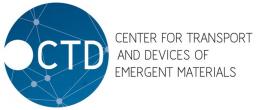Center for Transport and Devices of Emergent Materials (CTD)
Parent Units:Technische Universität Dresden (TUD)
Leibniz Institute for Solid State and Materials Research (IFW Dresden)

Contact
| web: | https://tu-dresden.de/mn/physik/forschung/ctd | |
| email: | ||
| phone: | +49 (0) 351 463-35582 | |
| fax: | +49 (0) 351 463-35993 | |
| postal address: | Technische Universität Dresden (TUD) / Leibniz Institute for Solid State and Materials Research (IFW Dresden), Center for Transport and Devices of Emergent Materials (CTD), Mrs Tatjana Schoffer, P.O. Box 270116, 01171 Dresden, Germany | |
| office address: | Technische Universität Dresden (TUD) / Leibniz Institute for Solid State and Materials Research (IFW Dresden), Center for Transport and Devices of Emergent Materials (CTD), Helmholtzstr. 20, 01069 Dresden | |
| partner: | Technische Universität Dresden | |
| partner: | Leibniz Institute for Solid State and Materials Research | |
Expertise
Das Center for Transport and Devices of Emergent Materials (CTD) an der TU Dresden verknüpft fakultätsübergreifend Forschungsschwerpunkte in den Bereichen der Materialforschung und der elektronischen Bauelemente.
Die elektronischen Eigenschaften von neuartigen Materialien – „Emergent Materials“ – werden dabei im Hinblick auf neue physikalische Phänomene und speziell auf ihr Potential für zukünftige elektronische Anwendungen erforscht. Konkrete Beispiele für „Emergent Materials“ sind topologische Isolatoren, frustrierte Magnete und andere stark korrelierte Elektronensysteme, hybride Materialien (z.B. mesoskopische Halbleiter-Supraleiter-Heterostrukturen, oxidische Heterostrukturen), Graphen und andere niederdimensionale Systeme, molekulare Nanostrukturen, komplexe organische oder metallorganische Verbindungen, sowie ferromagnetische Halbmetalle.
Im CTD werden „Emergent Materials“ gezielt in Form oder als Bestandteil von Devices, d.h. nanoskaligen elektronischen Bauelementen, hergestellt, experimentell untersucht und theoretisch modelliert. Das erlaubt zunächst das Studium von fundamentalen Materialeigenschaften, insbesondere von Transportphänomenen wie z.B. Quanteninterferenzen, ballistischem Transport, Spindephasierung, Spininjektion, Grenz- und Oberflächentransport etc. Zudem wird damit gezielt eine interdisziplinäre Brücke geschlagen zwischen Grundlagenforschung, hier der Synthese und dem Studium von komplexen neuen Materialien, und angewandter Forschung, z.B. im Bereich der Elektronik, mit Berücksichtigung der speziellen Materialherausforderungen in der Nanotechnologie.
***********English***********
The Center for Transport and Devices of Emergent Materials (CTD) at the TU Dresden aims at linking research efforts, distributed over different faculties and institutions, in the fields of solid-state physics, materials science and electronic devices.
The objective is to investigate the electronic properties of novel "emergent" materials with an eye towards interesting physical phenomena and their potential for future applications in electronic devices. Concrete examples for emergent materials are topological insulators, frustrated magnets and other strongly correlated electron systems, hybrid materials (e.g. mesoscopic semiconductor-superconductor heterostructures, oxide heterostructurs), graphen and other low-dimensional systems, molecular nanostructurs, complex organic or metalorganic compounds, as well as ferromagnetic half-metals.
Within the CTD, emergent materials are synthesized and produced as devices or parts thereof, i.e., in the form of nanoscale electronic elements. These devices will both be investigated experimentally and modelled theoretically. This enables us to understand fundamental materials properties, in particular transport phenomena such as quantum interferences, ballististic transport, spin dephasing, spin injection, as well as surface and interface transport. The activities of the CTD form an interdisciplinary bridge between basic research, i.e., the synthesis and study of complex materials, and applied research, e.g., in the field of electronics.
instruments
 View instruments (7)
View instruments (7)
Affiliations
Parent Units
| name | type | actions |
|---|---|---|
| DRESDEN-concept Project center (DcPc) | Center | |
| Institute for Solid State Research (IFF) | Institute | |
| Institute of Structural Physics (IFMP) | Institute | |
| Institute of Theoretical Physics (ITP) | Institute |
Daughter Units
| name | type | instruments | services |
|---|---|---|---|
| Chair of Materials Science and Nanotechnology (https://twitter.com/nanoDresden) | Professorship |
 (7) (7)
|
Last Update
Last updated at: 2021-11-19 16:22


